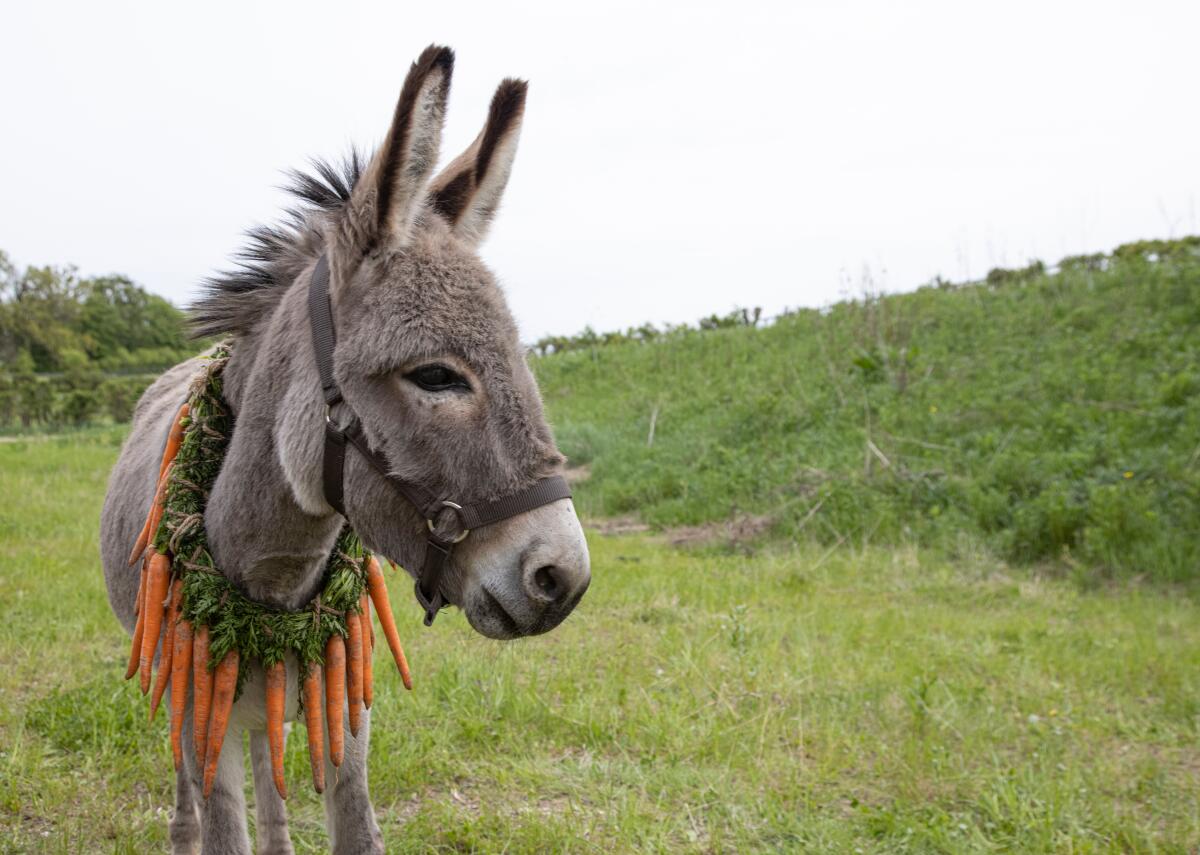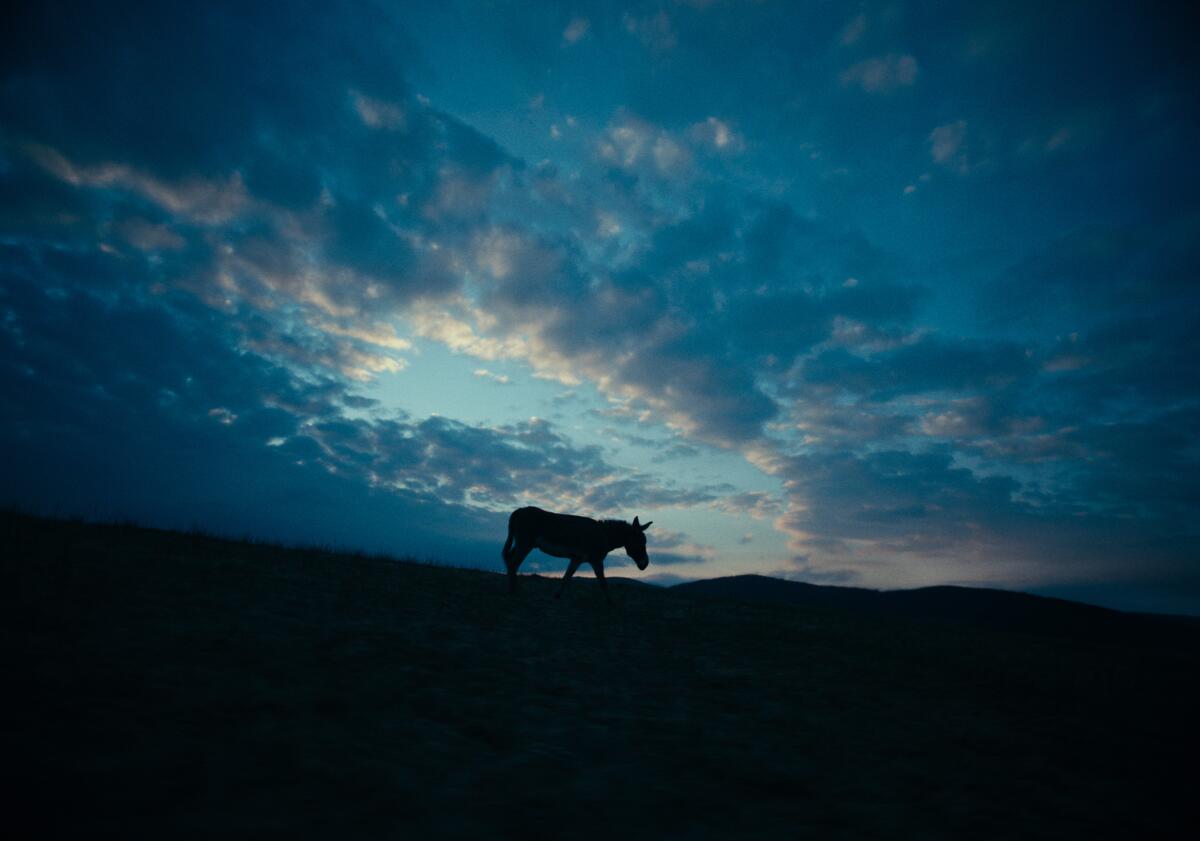Poland’s Oscar submission, ‘EO,’ looks to ease the plight of animals in the world

- Share via
When acclaimed Polish director Jerzy Skolimowski and his wife and collaborator, screenwriter and producer Ewa Piaskowska, set out to create a “donkey’s road movie,” they wanted their project to make a profound statement about the plight of animals in our brutal world. The result of their labor of love is “EO,” winner of the Cannes Film Festival jury prize and Poland’s entry into the international feature Oscar race.
“We knew that we didn’t want the story to be told in the traditional three-act Hollywood structure,” says Skolimowski, who is best known for directing films such as “Moonlighting,” “The Lightship” and “Essential Killing” and co-writing Roman Polanski’s 1962 classic, “Knife in the Water.” “One of the reactions we have been getting from audiences is that they don’t know what’s going to happen in the next minute or the next scene.”
In addition to paying homage to Robert Bresson’s 1966 seminal film “Au Hasard Balthazar,” which also centers on a mistreated donkey, Skolimowski and Piaskowska wanted to raise awareness of the plight of animals in the industrial farming world. “We have a house deep inside the forest in the Polish countryside, and every day we have a growing appreciation of nature and all the different creatures who share our world with us,” Piaskowska says. “We knew we had to say something about all the horrible things that happen to the animals in our world.”
Director Jerzy Skolimowski makes a stunning return to filmmaking with this homage to — and departure from — Robert Bresson’s ‘Au Hasard Balthazar.’
Shot by director of photography Michal Dymek, “EO” features six beautiful, sad-eyed stars (Tako, Marietta, Hola, Rocco, Mela and Ettore) who all portray the four-legged protagonist of the movie as he roams the Polish and Italian landscapes. “We had worked with donkeys briefly in a couple of our previous movies,” Skolimowski says. “Sardinian donkeys are the most beautiful breed. The eyes are larger, more expressive. I knew EO [an approximation of the sound he makes] must be gray with white spots around the eyes. I went to a stable near Warsaw to visit the animal that had hypnotized me the most in the photos that I had seen. His name was Tako, and as soon as I saw him, I knew he was going to be the star of the movie.”
“They are such innocent, gentle and good animals,” he adds. “They live to the fullest in the present moment. They never show narcissism. They witness people running around them with strange equipment, and they think we are crazy. It was such a kind set to work on because every person in the crew was picked because they were an animal lover. There were no raised voices or arguments.”
The veteran helmer notes that he enjoys working with donkeys much more than human actors. “There’s no discussions about the scripts or the characters’ motivations,” he says, laughing. “Donkeys don’t ask whether they should start the action with their left foot or the right or why they have to cross a bridge. Most important, they don’t have any egos. That meant that everybody working on the movie also had to lose their ego. I didn’t have a trailer because the animals had to get every possible luxury on the set. Even the horses in the movie each had to have their own wagon.”

The film also includes a memorable cameo by Oscar-nominated French actress Isabelle Huppert as a countess whose path crosses with the stoic donkey’s. “In the beginning, we didn’t have any particular actresses in mind, but we wanted someone who is considered royalty, a blue blood in the world of stars,” Skolimowski says. “Then we found out that she is also an animal lover and had expressed her love for animals. So, we decided to approach her and ask her to participate and fortunately she agreed. That helped us a lot because that would mean that more people would watch our movie, which is a European co-production between Poland and Italy.”
Skolimowski, who received the Golden Lion Lifetime Achievement award at the 2016 Venice Film Festival and has also acted in movies such as “White Nights,” “Eastern Promises” and “The Avengers,” says he is hopeful about the future of cinema. “I have become quite optimistic after I saw the reception that ‘EO’ has received so far,” he says. “It’s a big surprise to me. It proved to me that movies can still approach important subjects and bring audiences to theaters. Of course, it also proves that you can’t just repeat the same formulaic movies. You have to come up with fresh and exciting subjects.”
The couple hopes that “EO” will lead audiences to re-examine their attitudes toward animals. “We have both reduced our meat consumption significantly and we are on our way to become full vegetarians very soon,” says the 84-year-old director. “You just have to look at the beautiful brown eyes of cows to remind yourself never to eat meat again. We hope the ending of the movie shakes people a little bit and forces them to re-examine their attitude towards meat consumption for good.”
More to Read
From the Oscars to the Emmys.
Get the Envelope newsletter for exclusive awards season coverage, behind-the-scenes stories from the Envelope podcast and columnist Glenn Whipp’s must-read analysis.
You may occasionally receive promotional content from the Los Angeles Times.











